Kiersey Clemons: Five Years Ago, My Newest Role Would Have Gone to a White Girl
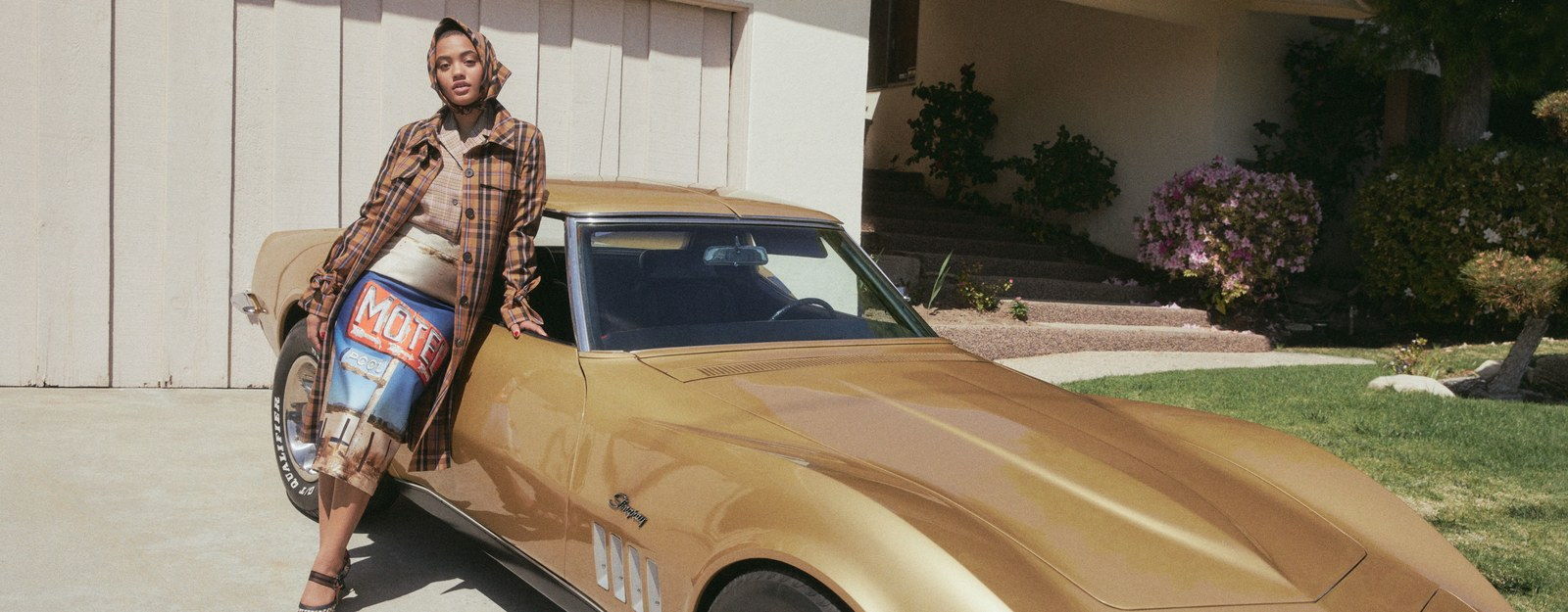
For a moment, crouching in a plaid suit in front of an immaculate home in the Los Angeles suburb of Ladera Heights, Kiersey Clemons looks like Fresh Princess Hilary Banks—if Hilary Banks said “Screw it” and shaved off all her hair. Born to a military family in Pensacola, Florida, the 24-year-old actress is as compelling in front of the camera as she is online. When an Instagram follower recently asked why she doesn’t shave her armpits, she clapped back, “Same reason you in my comments and not focused on your life. Just lazy, you feel me?”
It’s tempting to peg Clemons with the rebellious streak that defines many of the characters she’s played: queer tomboy Diggy in Dope, sweet but wayward Bianca in Amazon’s Transparent, student turned rocker Sam in this month’s Hearts Beat Loud. But Clemons has never identified as a troublemaker. “I was a pretty good kid, but I also knew when it was worth breaking the rules,” she says. “I don’t think that makes you a rebel, though, because that’s still exercising some type of caution.”
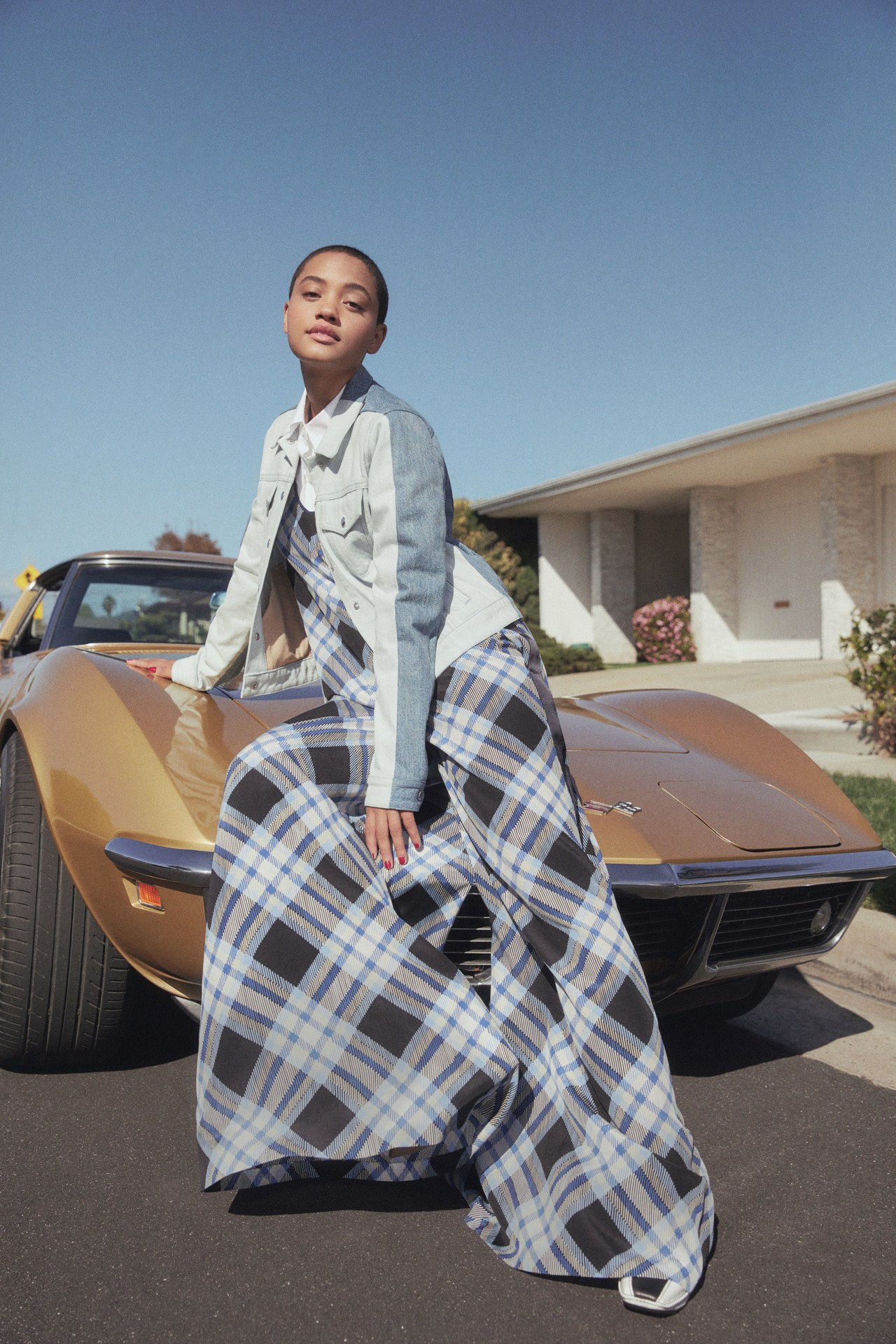
Who’s That Girl? Actress Kiersey Clemons calls her own aesthetic “nineties casual—denim, a plain white tee, and Nikes.”
Rag & Bone jacket, $350. DVF jumpsuit, $628. DKNY shirt, $79. Givenchy shoes.
Even her hair, a soft buzz she’s worn since last October, wasn’t intended to be a statement. “I got clippers, and then I went to my mom’s house, and my cousin and my sister cut it off—first with scissors, and then they just went for it and shaved it off,” she says. “I genuinely think that I look better with no hair, and I feel sexier.” Clemons’ approach to the current sociopolitical climate is equally adaptive. “I recently had to have a long talk with myself and be like, Where do you feel the most effective?” she says. “I find that I’m much more of a healer than I am anything else. And when we’re fighting like we are, we need healers.”
Her kind of healing? Actively carving out roles that represent the black experience. “Hollywood makes stuff that people absorb, and it lingers in your subconscious,” she says. “I’m good at acting, which used to feel kind of small, like, Fuck, that’s all I’m good at? And then I realized, No, it means something to be good at taking on emotions and affecting people. Instead of calling that my weakness and feeling like it’s not enough, I try to tap into that even more.”
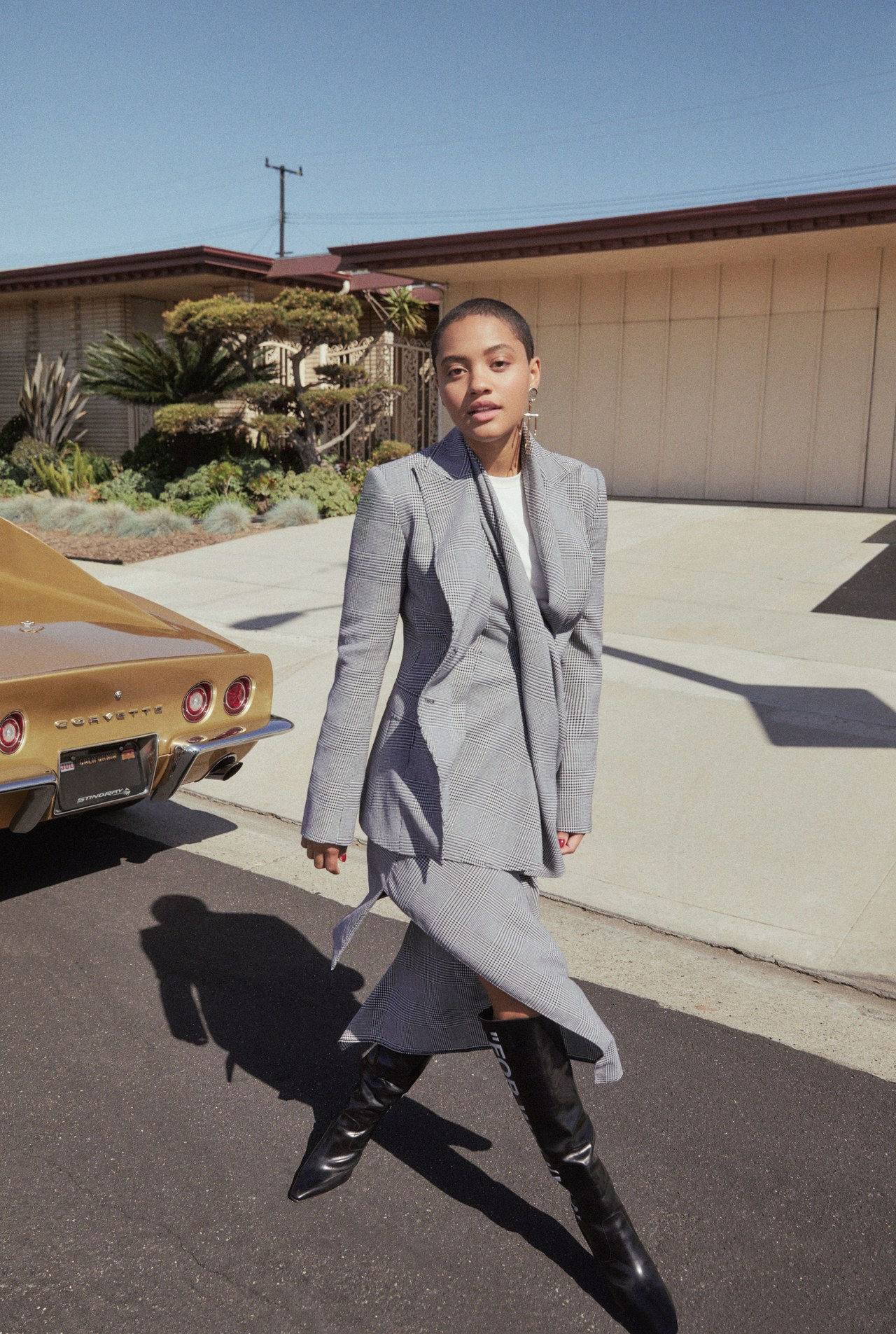
A Cut Above “I genuinely think I look better with no hair,” Clemons says. “And I feel sexier.”
Off-White c/o Virgil Abloh blazer, skirt, boots. DKNY T-shirt, $69. Givenchy earring, $590 for pair.
And her next project, Sweetheart, a survival thriller about a “queer brown girl stuck on an island,” will require her to go even deeper. “I don’t have a supporting cast to make me look better. It’s just me,” she says. But she sees that as progress, not pressure: “I don’t think that would have happened even five years ago. They wouldn’t have trusted me to carry that, if we’re being completely honest. She would be white.”
Clemons was drawn to the project for the same reasons she’s still obsessed with Solange’s A Seat at the Table and Kendrick Lamar’s Damn: “We were so thirsty for those albums. And I want to hear and see more stuff like that,” she says. “We’re now talking about race openly and closing those gaps. Well, we’re moving in the direction of closing those gaps.”
As for that bad-girl image, when I ask Clemons to name renegade women who inspire her, she mentions singer Eartha Kitt, who was blacklisted by the music industry after expressing antiwar sentiments some 50 years ago. “She sacrificed her space in art to make a point that needed to be made,” she says. “That’s rebellion to me. I don’t know if I’ve done enough to earn that title yet.” Angelina Jolie also makes the list. “She has rebelled against everything we said that she was, which was limited to being the hot warrior chick,” she says. “She’s doing her part to save the world and raise those beautiful children and tell stories on their behalf. That’s very rebellious to Hollywood, I think.”
Her generation, Clemons believes, is primed to make its own mark. “I’m surrounded by so many smart, well-spoken young women, which is as intimidating as it is inspiring,” she says. It also puts her own purpose in sharper relief: “Nina Simone said, ‘An artist’s duty is to reflect the times.’” Challenge accepted.
Read on for more outtakes from Grown-ish writer Kara Brown’s interview with Clemons:
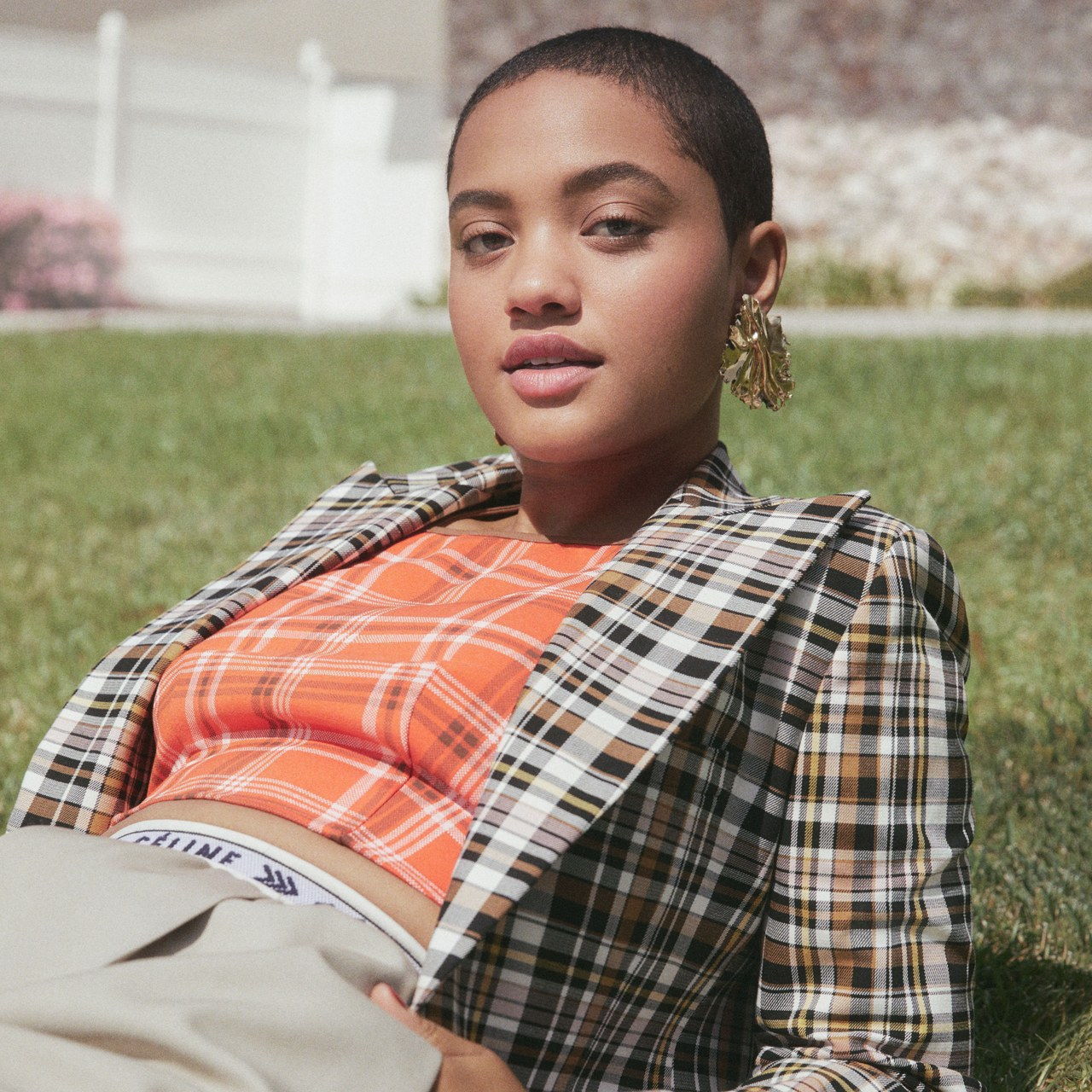
Sweet Disposition “I find that I’m much more of a healer than I am anything else,” Clemons says. “And when we’re fighting like we are, we need healers.”
Burberry blazer. I.Am.Gia top, $46. Céline pants. Annelise Michelson earring, $619.
GLAMOUR: In the context of Hollywood, do you feel rebellious?
KIERSEY CLEMONS: No. I don’t think I’m rebellious. I think we’re sticking it to the man [in terms of] bullshit that we’re not going to tolerate any longer. But, if I’m being honest, I think I’m a lot more modest than people would assume that I am.
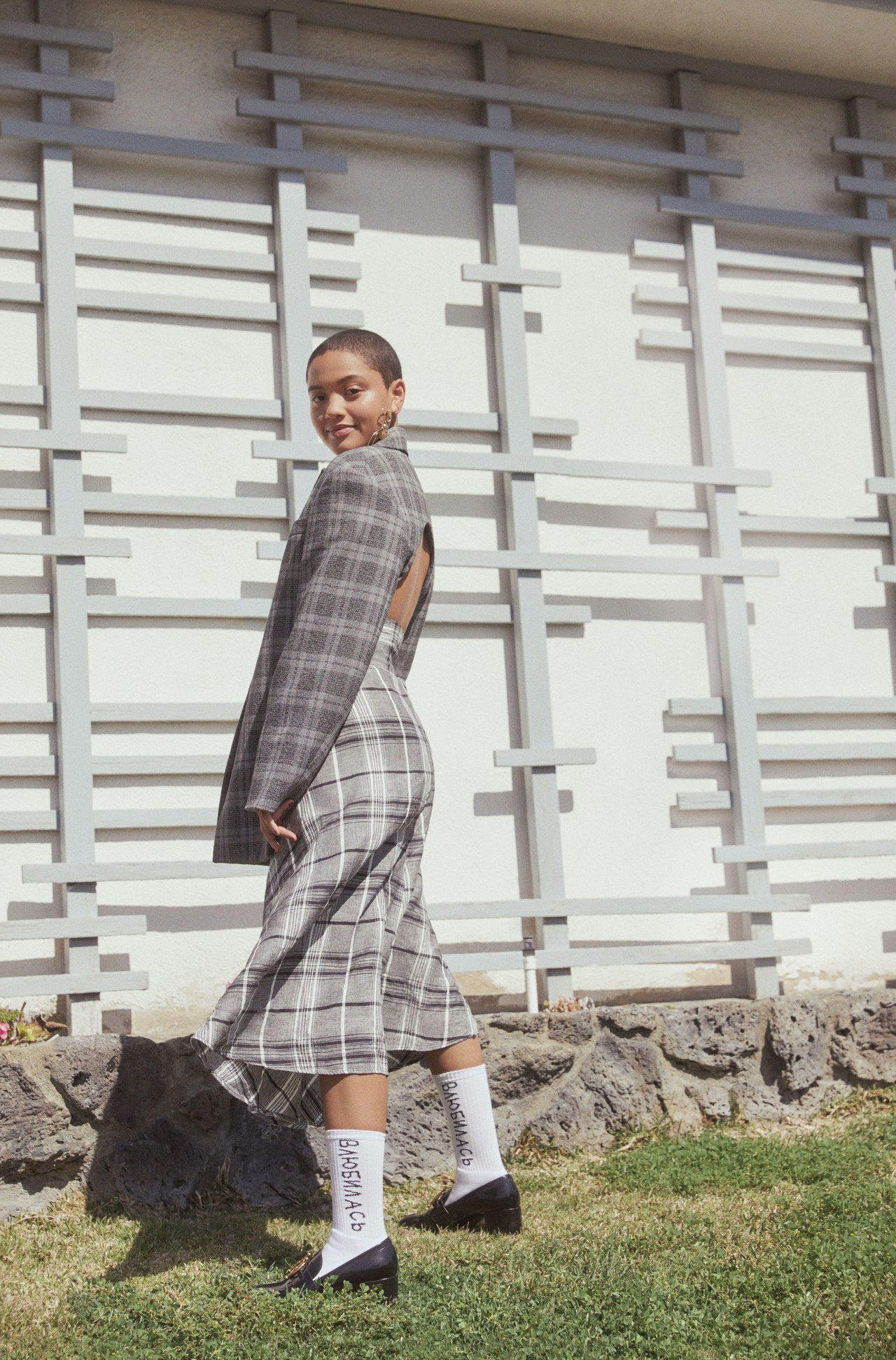
Voice of the Times “We’re all angry,” Clemons says, “but we shouldn’t lose our willingness to talk to people who are different than us. That’s where the change happens.”
Ellery blazer. Zara skirt, $70. Mounser earring, $245. Natasha Zinko socks, $90 for three pairs. Dior pumps. See Glamour Shopper for more information. Hair: Randy Stodghill, manicure: Emi Kudo for Dior Vernis, both at Opus Beauty; makeup: Karo Kangas for Dior Beauty; production: Viewfinders.
GLAMOUR: Is there a group that you hope to be speaking to through your work?
KC: I carry the responsibility of speaking to whoever is like me. I’m not much of a stay-in-your-lane type of person, but I think, right now, we’re all expecting everyone to be the same. To fight the fight in the same way. So some people, they’re very active on social media. And that platform encourages people that are active in real life to go out and make the calls and go to the meetings. And then there’s a person like me, where I feel like I’m most effective one-on-one. I’m most effective in a conversation with someone, or taking on a role and doing that. I don’t find that I’m a great public speaker. I was when I was younger. And I think that, as I’ve gotten older and been in the industry a bit more, I learned there’s so many different types of people. And I actually don’t know how to talk to them all appropriately. I’m better at emotionally affecting people.
GLAMOUR: What are the issues right now that you feel speak to you the most?
KC: Everything. I think, right now, understanding and holding on to empathy as we fight the fight. We’re all angry. But we shouldn’t lose our willingness to talk to people that are different than us. Because that’s where the change happens. When you talk to someone that’s different than you, you give them a new perspective. And they may not apply it immediately, but they might apply it when they interact with a family member that’s different than them, or a friend that’s different.
GLAMOUR: What’s been some art that has spoken to you in a really visceral way in the last year?
KC: Call Me by Your Name was such a great movie. And Get Out, obviously, just crossing that line with genre regarding race. And diminishing what race even is, which is really exciting. America puts so much more weight on race than other countries do, I’ve learned.

